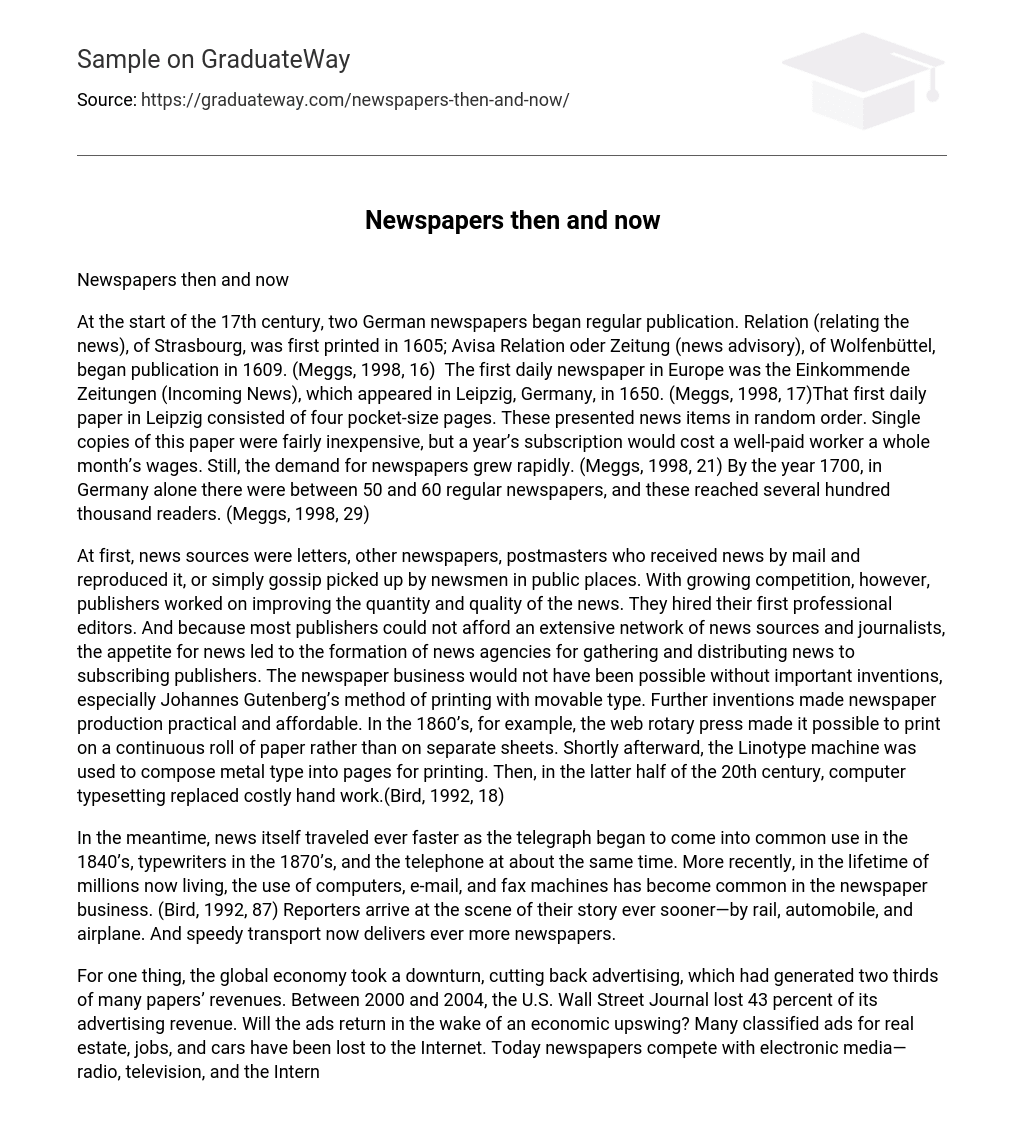At the start of the 17th century, two German newspapers began regular publication. Relation (relating the news), of Strasbourg, was first printed in 1605; Avisa Relation oder Zeitung (news advisory), of Wolfenbüttel, began publication in 1609. (Meggs, 1998, 16) The first daily newspaper in Europe was the Einkommende Zeitungen (Incoming News), which appeared in Leipzig, Germany, in 1650. (Meggs, 1998, 17)That first daily paper in Leipzig consisted of four pocket-size pages. These presented news items in random order. Single copies of this paper were fairly inexpensive, but a year’s subscription would cost a well-paid worker a whole month’s wages. Still, the demand for newspapers grew rapidly. (Meggs, 1998, 21) By the year 1700, in Germany alone there were between 50 and 60 regular newspapers, and these reached several hundred thousand readers. (Meggs, 1998, 29)
At first, news sources were letters, other newspapers, postmasters who received news by mail and reproduced it, or simply gossip picked up by newsmen in public places. With growing competition, however, publishers worked on improving the quantity and quality of the news. They hired their first professional editors. And because most publishers could not afford an extensive network of news sources and journalists, the appetite for news led to the formation of news agencies for gathering and distributing news to subscribing publishers. The newspaper business would not have been possible without important inventions, especially Johannes Gutenberg’s method of printing with movable type. Further inventions made newspaper production practical and affordable. In the 1860’s, for example, the web rotary press made it possible to print on a continuous roll of paper rather than on separate sheets. Shortly afterward, the Linotype machine was used to compose metal type into pages for printing. Then, in the latter half of the 20th century, computer typesetting replaced costly hand work.(Bird, 1992, 18)
In the meantime, news itself traveled ever faster as the telegraph began to come into common use in the 1840’s, typewriters in the 1870’s, and the telephone at about the same time. More recently, in the lifetime of millions now living, the use of computers, e-mail, and fax machines has become common in the newspaper business. (Bird, 1992, 87) Reporters arrive at the scene of their story ever sooner—by rail, automobile, and airplane. And speedy transport now delivers ever more newspapers.
For one thing, the global economy took a downturn, cutting back advertising, which had generated two thirds of many papers’ revenues. Between 2000 and 2004, the U.S. Wall Street Journal lost 43 percent of its advertising revenue. Will the ads return in the wake of an economic upswing? Many classified ads for real estate, jobs, and cars have been lost to the Internet. Today newspapers compete with electronic media—radio, television, and the Internet. On the other hand, the demand for news is alive and well. Professor of media economics Axel Zerdick remarked to a Frankfurt, Germany, newspaper: “The crisis is not quite as bad as most journalists believe.” The chief editor of a German daily’s local section echoed that view, observing: “The regional [newspaper] is still going strong.” (Bird, 1992, 76)
References:
Meggs, Philip B. A History of Graphic Design. John Wiley & Sons, Inc. 1998. (pp 130–133)
Bird, S. Elizabeth. For Enquiring Minds: A Cultural Study of Supermarket Tabloids. Knoxville: University of Tennessee Press, 1992: 12-17.
Published in UK as the “UK’s only web-based newspaper” in January 2002 in hard copy magazine called “Web Pages Made Easy.”





